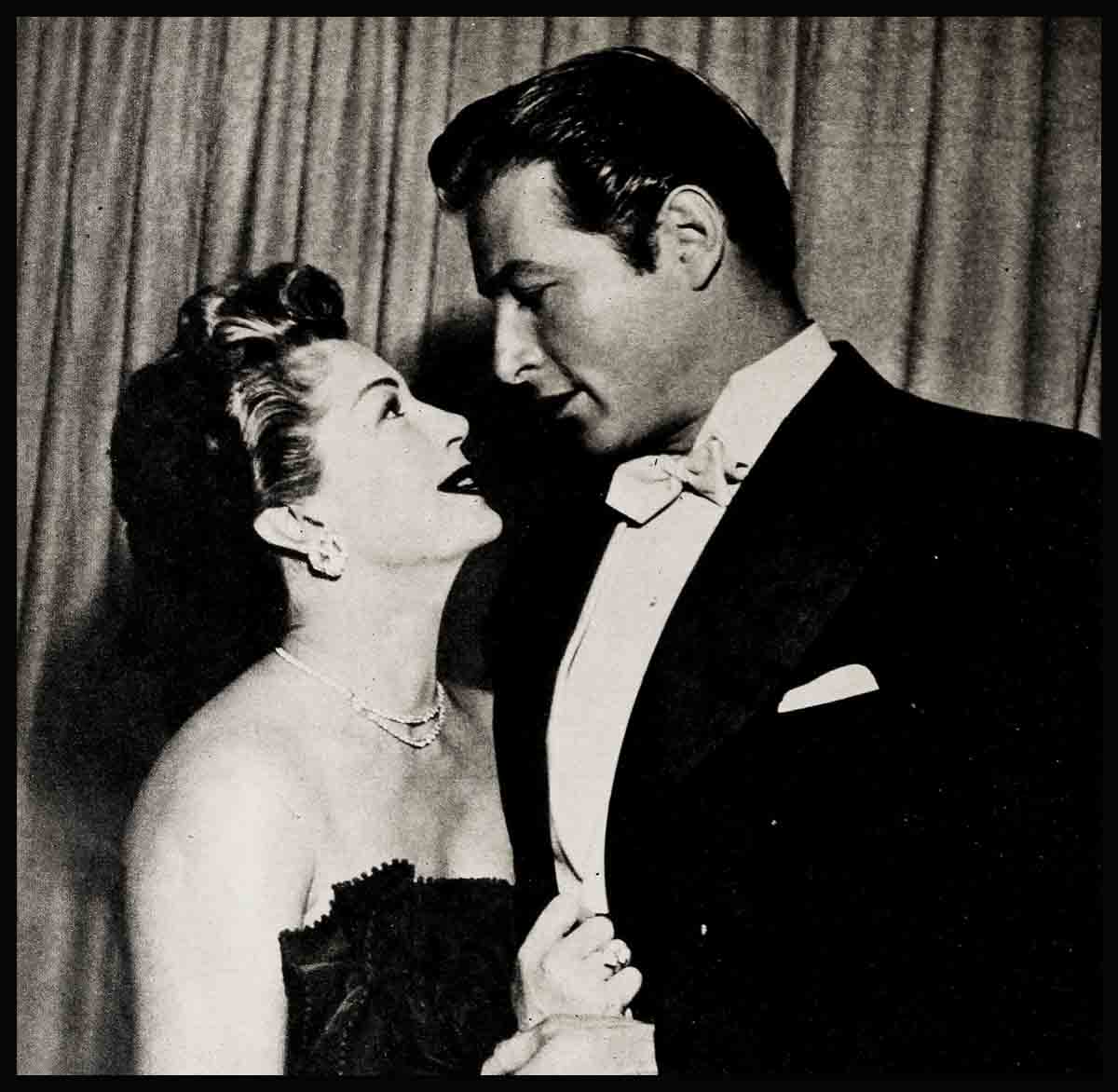
The First Year Is The Hardest—Lana Turner & Lex Barker
For Mrs. Alexander Crichlow Barker, 2d, of Holmby Hills, California, it was one of those times when a lady doesn’t know whether to laugh, cuss or cry.
Here she was on her dainty knees, scouring the bathroom tile with her newly restored blonde coiffure wadded up in a scarf and a feeling of desperation beneath it. The couple who took care of her big house had walked out that morning and the upstairs maid had given notice. Fourteen dinner guests were due in a few hours and out in front the newly widened driveway was a fresh mass of gooey tar. A cement mixer rasped dismally beside the new guest wing which gave no indication whatever that it would be ready for the arrival of her sister-in-law from the east. The carpenters had just built the steps in front of the place instead of behind it as designed and the warm grey paint she’d chosen had come out an asphyxiation blue and would have to be done over. There was silver to polish, the house to clean and a hundred urgent items hammering at her nerves.
A discordant crash of piano keys smote them next, along with a frustrated wail from her daughter Cherry, “I’ll never learn to play this silly thing!” Mrs. B. had all she could take.
“Cheryl Christina!” she yelped, using the full, formal tag reserved for discipline, “you put your mind to your practicing and not another peep out of you! I’m in no condition.” Then, unkinking her cramped legs, she dragged herself wearily into the den and collapsed on the sofa, with feet propped on the arm for relief. At this point of surrender a blandly handsome giant, irritatingly cool, calm and dripping pool water, strolled into the room and inquired pleasantly, “Hi, Mama—taking it easy?”
Mama leaped to her feet as if a bee had stung her. “Taking it easy!” she cried indignantly. “Why, why—” and amid tears Lana Turner sputtered out her woes.
Half-way through the outburst the strong arms of Tarzan reached out for his mate and lifted her up even with his six feet, four. “It must be very rugged,” grinned Lex Barker sympathetically. “But tell me—sorry you married me?” And he didn’t let her down until the answer came—“Not for one minute!” And along with it a contentment for Mrs. Barker that kicked away all the cares—real and fancied.
Legally speaking, you might say Lana Turner’s statement that recent trying day was obtained under duress and therefore should be stricken from official records. But just for this record, she meant every word she said. Lana wouldn’t trade places with any other girl in the world. As Lana and Lex Barker toast their first anniversary in champagne she can count almost as many blessings as bubbles.
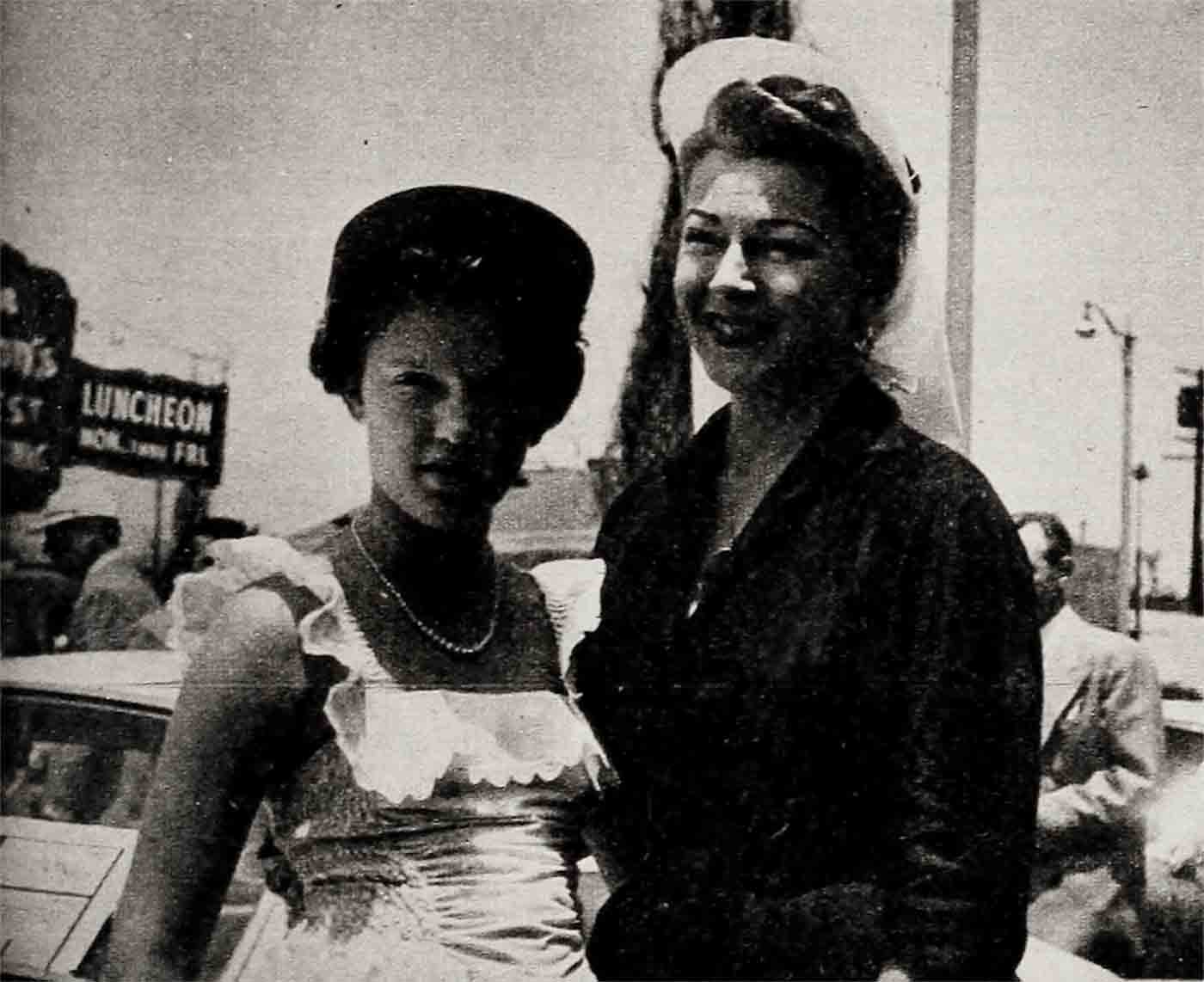
For the first time in her life Lana has a husband who treats her as a partner—not a toy.
For the first time, too, Lana is solvent—and with money in the bank! Only a few months ago she was heavily in hock. Today she doesn’t owe a penny outside current bills; she has annuities, blue chip stocks and interest in some oil wells.
For the first time the playgirl aura that palled is gone. For the first time Lana isn’t escaping from an anxious, unhappy home life to court the frantic “pleasures” of Hollywood’s glitter mills. She’s running her home instead of letting it run her away. The girl who used to make sensational headlines every week, hasn’t made even a mild one in fifty-two weeks.
For the first time, too, she has a happy, congenial and rounded family—the sister that Cheryl always longed for in Lex’s Lynn, her exact age, eleven, and a little brother “Zan.” What’s more, there are plans and good prospects for new babies of her own.
Lana’s career has jumped back into high gear, with the high powered, glamorous kind of pictures that made her famous. She’s playing super-sexy Astarte in The Prodigal, MGM’s showiest effort of the year, so expensive that it doesn’t even have a budget. And this on a brand new contract for five more years at $5000 a week, with an option for two more.
Most of this—and more—Lana Turner well knows is a direct result of the happiness, peace and stability she has found in her marriage with Lex Barker. And that is a solid surprise to almost everyone—including the lucky lady herself. If cynics viewing Lana’s past marital storms—and Lex’s—didn’t give the union an outside chance at the start, Lana herself gave it an even harder time. Not much more than a year ago, “marriage” to Lana was understandably an unpleasant word. No girl ever gagged more at the scent of orange blossoms.
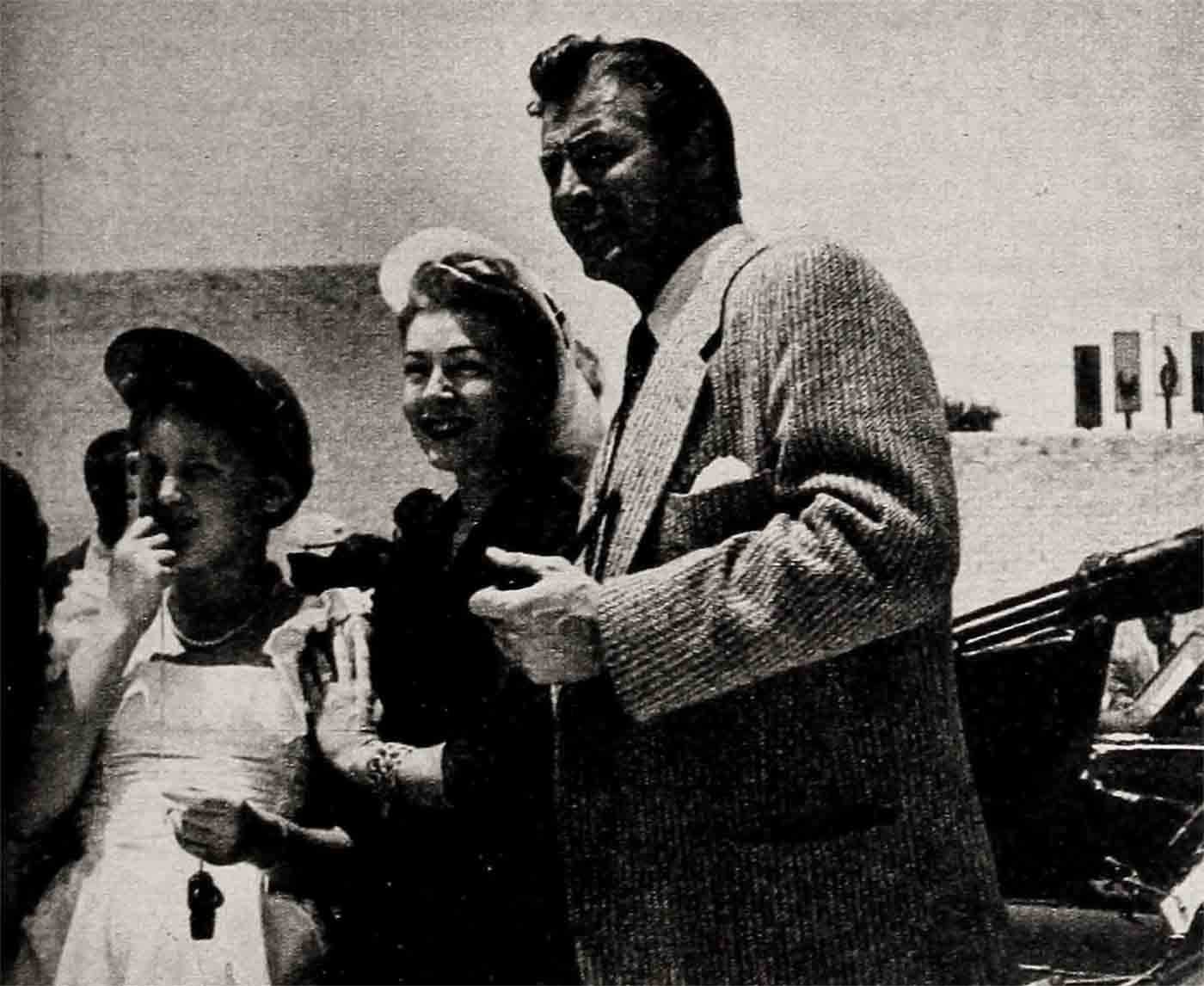
The big house on Mapleton Drive that she had salvaged from the wreck of her marriage with Bob Topping was up for sale. Lana never thought she’d be needing it again. She had grabbed at the chance to leave Hollywood and its memories for Paris to make Flame And The Flesh, taking her mother Mildred and Cheryl—all the family she had—with her. But before she left, she made the happy mistake of accepting an invitation to dinner at Lex Barker’s Westwood apartment. After a home-cooked meal she almost dropped her wine glass when that calm character observed, “Now, when we get married—”
“I beg your pardon!” gasped Lana. “When who gets married?”
“Us, of course,” grinned Barker. “Who else?”
“I think,” Lana cooled him off, “you’ve had too much of this wine and I think you had better take me home.” Which he did. But he’s pretty stubborn.
Only a few weeks later when Lana boarded the transatlantic plane at Idlewild airport there was A. C. Barker II, in the seat next to hers pretending to be surprised, as she definitely was. He explained that he’d been to see his folks in New York and was on his way to Italy to make a couple of pictures for Cinemex. He didn’t say why he was going by way of Paris or why his seat happened to be next to hers. But she could guess—and so without mincing words Lana corrected all mistaken impressions before they took off.
“I’ll look forward to seeing you in Europe,” she promised. “But marriage is out. Never again. I’ve had it.” But that, of course, was where Lana Turner was wrong.
When you review an actress’ courtship, marriage and what has followed on a first anniversary eve, events are prone to be tinted in rosy hues, especially when things have worked out as happily as they have for her. But Lana is not the type to paint any lily. “Believe me, I was putting on no act. I wasn’t being coy about anything,” she says, frankly, “or playing hard to get. I just plain didn’t want to get married. I thought certainly experience had proved it wasn’t for me ever again.”
Lex was no stranger to Lana before all this began. Most people remember their highly publicized exchange of escorts at Marion Davies’ big party. Lana came with Fernando Lamas and Arlene Dahl came with Lex—and after the public fireworks they switched partners. Since then Lana had seen Lex off and on.
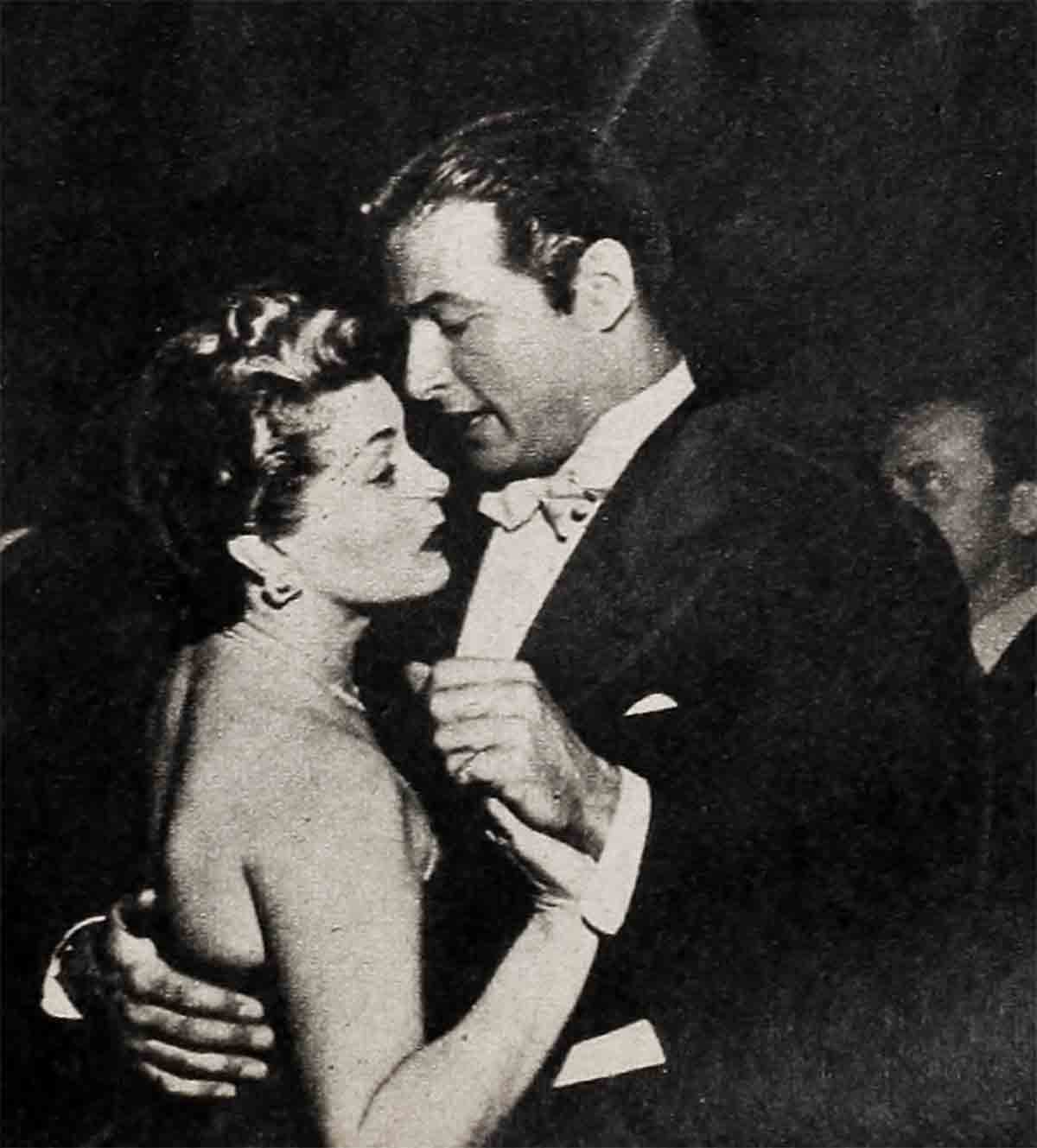
She knew he was from a good New York family, a graduate of Phillips-Exeter Academy headed for Princeton until a weakness in math and a break on Broadway changed his plans to be an engineer. She knew he was variously talented—formerly a Manhattan commercial artist, had been the liaison officer with the French Zouaves in North Africa whose language he spoke like a native. She knew he had all the social graces, was well-traveled and a gourmet who liked his own cooking, that he was an athlete of proportions at golf, tennis and skiing. She knew he was witty, affable, friendly and of course handsome as all get out with a Greek god body. He’d had reasonable success although he considered himself destined for better things than his ape-man roles. She also knew he had a way with the ladies and that she liked him herself.
But if Lana Turner had been on the prowl for her fourth husband—which she wasn’t—Lex Barker definitely would have been the last man in the world she’d have picked as her quarry.
She knew about Lex’s unhappy first marriage and even more about his brief marriage. to Arlene Dahl. Strangely enough, these domestic demerits—both Lana Turner’s and Lex Barker’s—actually drew them together and have held them that way ever since. Both appreciate what they’ve found in each other.
As Lex says today, “Lana’s the first woman I’ve ever known who listens to what I tell her.” And as Lana says, “Lex is the first man I’ve ever known who would discuss everything with me.” In short, they have companionship in addition to adult love. And Lana’s discovery of Lex Barker’s capacity for that is really what changed her mind. In Europe she saw a side of him she hadn’t known before, a side she liked too much to lose.
For eight months Lana and Lex carried on a European courtship. Mostly it was a courtship family style, with Lex’s children and their governess in Italy, Cheryl and Lana’s mother in Paris. Both the things they did—their sightseeing rambles throughout Italy, France and Spain—and the places they stayed—Naples, Paris, London, Capri—were with kids and in-laws around. When picture locations pulled them apart there was something missing, not only for Lex and Lana, but for Cheryl, Lynne and Zan.
Lana found herself in the puzzling position of refusing to admit she was seriously in love with Lex Barker—and at same time knowing she was kicking fate right in the teeth. “Even when I was saying ‘uh-uh’ to Lex I wrote the real estate agent back home and yanked my house off the market,” she remembers. “Now why would I do a thing like that?”
Bank Holiday—the time when all England closes shop tight—was when Lana’s resistance finally weakened. She was in London for interiors of The Flame And The Flesh” when Lex flew up from Rome. They drove up to Maidenhead on the Thames, and a lovelier place, Lana thinks, she’s never seen—with willows sweeping the shimmering river and antique beauty all about. “Anyone who could be in Maidenhead and not get romantic isn’t human,” she sighs. “Nobody ever accused me of that.” So when Lex asked for the 900th time, “When are you going to marry me?” she found herself answering that she was going to the minute the picture was finished. And that is about what they did, one year ago September 7.
Among Lana’s first-year memories naturally the ceremony in Italy stands out above all. There was another ceremony, of course, last Christmas Eve in Hollywood—just to wrap up the union without question. But the rites in Turin are the ones that Lana and Lex Barker are celebrating this September as most of Turin did at the time, despite Lana’s careful plans to make a “quiet affair”—still remembering the showy rites with Bob Topping and the disastrous results.
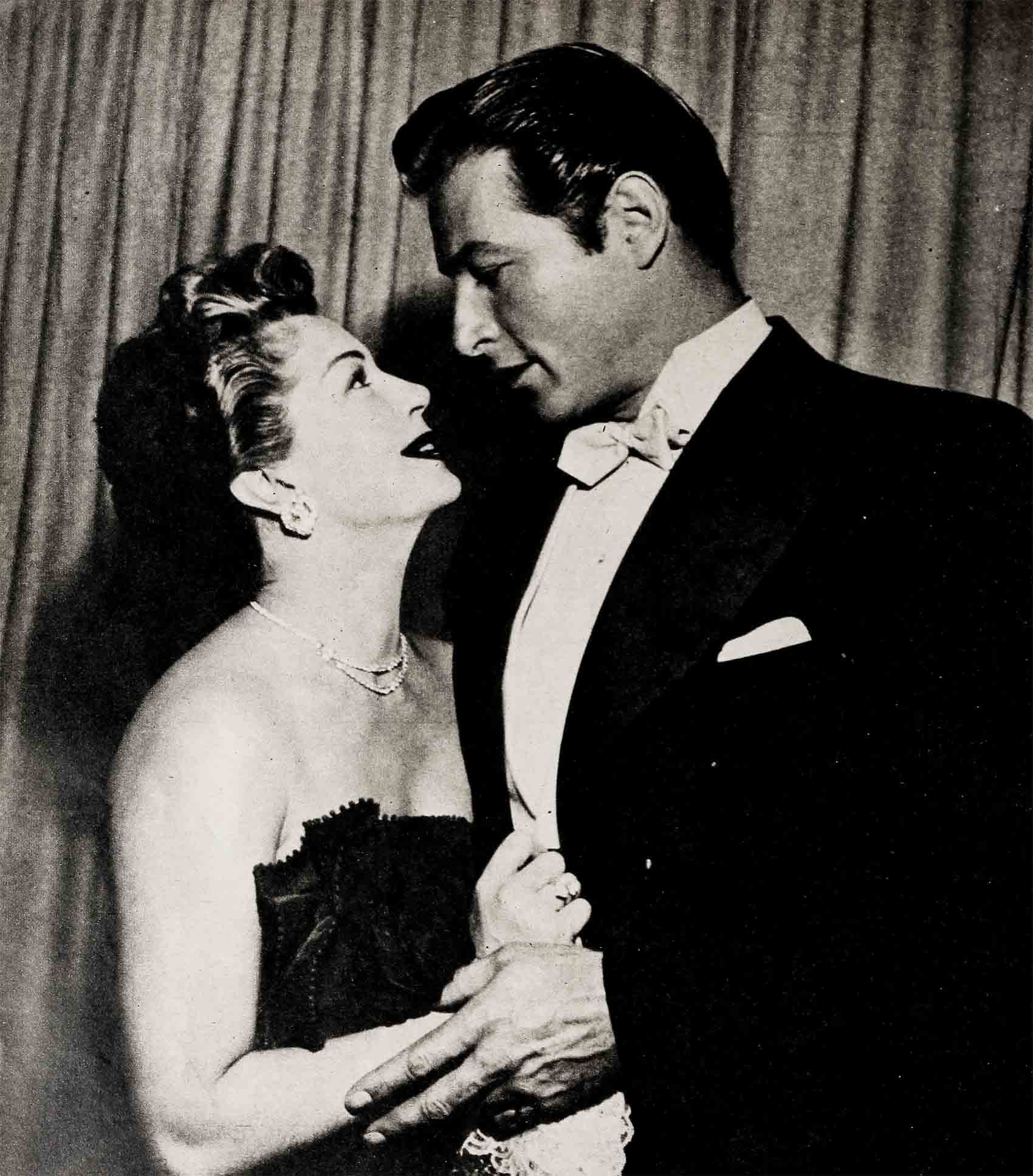
They chose Italy because Lex’s children were there and because, as Lana explains, “People in Italy get married to stay that way. We wanted all the good omens we could find, because both Lex and I wanted this to be for keeps.” That charm, so far, has worked like a charm—but the memory of their cloak-and-dagger precautions for privacy and the way things turned out, still makes Lana laugh.
“We took a villa up on a hill overlooking the Po River to get all the family together. A place with high walls and hedges. We paid off half of Italy, I think, to keep the secret. We arranged to have the wedding at six o’clock after the registry closed, swore the mayor and our attorney to secrecy. On our wedding day we pulled down the blinds because the bushes were jumping with reporters wondering what was up, but with a pretty good idea.
“The afternoon of the wedding Lex drove out in the Jaguar alone—or so it seemed. But down on the floor in the back was the bride—me—covered with a car robe. I wasn’t exactly blushing but I was mussed and smothering. I’ve always thought he kept me there too long just to make me suffer. But there was one thing we didn’t know—in Italy there’s a law that all civil weddings must take place with the doors wide open. We might as well have been married in the town square! I wouldn’t say it was a romantic setting. Scrubwomen with mops and pails crowded around us and, because the ceremony was in Italian, interpreters had to tell us what was going on all through the event. It was hot, it was confusing and it was crowded. But it was very, very real to me and the people couldn’t have been sweeter. I still have the bouquet of white bovardia the mayor who married us gave me. How he knew that was my favorite flower I’ll never know.”
The honeymoon was more romantic although Lana worked throughout most of it. Mildred Turner spirited all the kids back to Paris by train, then off to Hollywood for school. The newlyweds drove back, picking out every idyllic inn they could find on the way. They stayed in Lana’s Paris apartment while Pierre Balmain fitted her wardrobe for Betrayed. Then Mr. and Mrs. Barker went to Holland on location. They spent most of the time there in the romantic forest of Arnhem in the Koonings Jaght, a king’s vast hunting lodge. The leaves were turning crimson and gold, deer came right up to their window and in the evenings geese streaked south across the sky. No wonder Lana remembers Betrayed, despite its ominous title, as the most heavenly picture job she ever had. She worked almost every day while Lex caught up on his golf with Vic Mature. There were relaxed evenings by the fireplace and good companionship with Vie and a fellow Lana’s been soft on in a filial way for years, Clark Gable. By the time they flew back to Hollywood last December, Lana and Lex realized what they had together and made some resolutions.
“They were pretty simple ones,” Lana reveals. “Just these—that no matter what happened we’d never say two things—either, ‘I’m leaving’ or mention the word ‘divorce.’ If you don’t say those things they just can’t happen. Of course, we’ve had arguments,” she admits frankly, “some hot and some heavy. The first year is always the hardest. Neither Lex nor I are perfect. We’ve had our adjustments to make. But we’ve never gone to sleep without saying ‘I’m sorry’ and we’ve never held a grudge. I know the word seems strange applied to me—but the thing Lex and I try to be is sensible.”
Lana’s right. On past performance not even her best friends would beam that * level-headed adjective in her direction. “Maybe I’ve caught some sense from Lex,” she guesses, “or perhaps I’ve finally grown up. After all, it was about time.” Anyway, on the first year’s record both Lana and Lex have demonstrated sane thinking.
Take the house they live in. It’s the same house Lana and Bob Topping bought, the one that was up for sale when she left for Europe—and reasonably so. Just Lana and Cheryl would never need a fourteen-room mansion. Like all honeymooners, the Barkers dreamed of something new, designed just for them. “But then,” says Lana, “we asked ourselves why. It’s perfect—handy for both of our studios, big enough for our family, a huge yard for the kids, a tennis court and pool. All it needed was changing for our particular needs. Instead of selling and finding something else probably half as good, we just fixed it up.”
Actually, the big chateau looks very much as it did before Lana left it. The décor and furnishings are of the Topping era. Besides Lex’s sword, dagger and gun collection in the lanai; some paintings and souvenirs brought back from Europe, there’s nothing different inside. They added a new guest wing over a double garage. Lex’s sister, Fredricka and her son Peter stayed there and Lynn and Zan sleep there when they come over from Jack and Connie Adams’ house in Westwood nearby. The garage and expanded driveway is to handle their collection of cars—Lex’s Lincoln Capri, the red and black Volkswagen baby bus, and Lana’s new yellow racer, the Ghia Fiat that’s already the talk of car-happy Hollywood. The other improvement was to convert an upstairs porch into a walk-in wardrobe closet for Lana, although there’s not too much to fill it with these days. Here again, Lana has changed.
There was a time when Lana would romp oft to “kill a couple of hours and spend $1500,” as she remembers a little unbelievingly now. Then if she saw a dress she liked she’d buy it in all colors. Now she’s lucky if she brings one home. Another smart move Lana made the minute she returned to Hollywood was to hire a business manager. “I never used to know where my money went. I didn’t know whether I had fifty cents or $5000. I still don’t prize money for money’s sake, but for the first time in my life, I know what a comfortable feeling a little nest egg is.”
Lana has more than that—although as late as 1952 she wondered how she’d ever pay off her back taxes. Beatrice Halstead, the shrewd woman who handles her finances helped work the miracle. She tells Lana, “This is for expenses. This is for taxes. This is to play with—and this is to be saved.” There’s no back talk. Lex and Lana are just as sensible about their family finances. He makes less than half Lana’s salary and the arrangement they have divides the household expenses in proportion.
All this doesn’t mean that Lana has turned pinchpenny. Nor does she have to. The Ghia Fiat is proof of that. Lana bought the flashy sports car and herds it around Hollywood considerably under the 150 m.p.h. it can do, but actually it was Lex who had his eye on the beauty ever since he and Gary Cooper took a spin in one at the Paris auto show and drooled. Knowing that, when Lana spied hers at Dutch Darrin’s shop in Hollywood she said, “Wrap it up,” although the price equals a down payment on a fair-sized house. There’s only one other like it in America. So far she hasn’t collected a traffic ticket—although the other day when Lex called her at the beauty shop and said he wanted to see her, he had hardly put down the phone before the racer screeched to a stop in the driveway. “How did you get here?” he gasped, “Fly?” And that’s another thing.
Since Lana and Lex were married they’ve hardly been apart longer than brief hours like that—consciously, too. Both know how two careers can split up a home, that in Hollywood absence is not likely to make two hearts grow fonder. So they’ve resolved to stick closer than glue. en Lex was called back to New York at his father’s last illness Lana went with him. When he went off to the drab desert town of Mojave to shoot Yellow Mountain,Lana trotted along, too, living in a motel where there was nothing to do night or day—except be with her old man. But that’s where she was.
How long they can keep up that side-by-side resolve, of course, is questionable now that both careers are starting to roll again. Lex’s new contract with Universal-International might take him almost anywhere and Lana herself has no assurance she’ll check in forever at Culver City after The Prodigal and My Most Intimate Friend,which follows, with Lana’s most intimate friend Ava Gardner. One of the bittersweet breaks they’ve had since they came home is career idleness. It’s been great for companionship but as both complain, “By now we’re getting a little buggy.” There’s nothing a contract actor can do when the studio doesn’t call except wait.
Fortunately, they’ve had plenty to do with the house projects, catching up with their friends in the evenings and keeping three kids happy by day. Lex and Lana have Lynne and Zan every weekend and they’re hoping to have them more and more. That’s what they really built the new bedrooms for. Fortunately, Lex and his first wife, Connie, and her husband, Jack Adams, are on friendly terms. As for Cheryl, she’s pretty crazy about the new daddy she calls “Po.” Lex is the type who understands ladies of all ages and knows how to please them. He started Cherry off on her present ice-skating kick and when the piano lessons get too tough takes her side against mama as Lana wails “he does in most everything”—but she’s not really too mad about it.
When Cherry begged to leave for a Girl Scout camp, Lana acted like a fluttery mother hen and forbade the overnight excursion. There was quite a scene, with tears and stormy protests until Lex sauntered in, learned the issue and broke it up with, “Why not? That’s what Girl Scouts are for, isn’t it?” Outnumbered, Lana gave in and wound up driving the whole troop to the mountains and bringing them back. Almost every day it’s a family struggle to see who picks up Cherry at school, and it was Lex’s idea that Cheryl go along when he took Lana to Acapulco for a second honeymoon after their remarriage.
Of course, life is not all kids for the Barkers. Both Lex and Lana are still out for adult good times, although what they call good times today aren’t escaping from nervous loneliness to the nightclub circuit. They get around—with Liz Taylor and Mike Wilding, Ursula Thiess and Bob Taylor, Cubby and Nedra Broccoli and a lot of others, both at their houses, and out on the town—but not so- often. The other night they took their house guest, Fredricka, to see Joe E. Lewis on the Strip and pulled in, a little shocked at themselves, around two-thirty A.M. But mostly it’s a prosaic married folks back-and-forth dinner deal, at which Lana confesses she’s hopelessly in debt. “We owe everybody in this town,” she sighs, “and that’s one thing my business manager can’t fix.” This delinquency leaves Lex Barker strangely unmoved. He has another new and sensible idea about Hollywood social life.
“Hollywood actors just get in trouble when they party around,” observes Lana’s husband, who should know. “Sports are the thing. There are a lot of things people don’t know about Lana. Guess what I married. An athlete! You ought to see this girl swim, play tennis and golf. Why the pro at Bel Air says she has the most perfect natural swing of any pupil he ever had!” That may be a surprise to the Mocambo set, but it’s gospel.
Lex dragged Lana practically by her hair onto a golf course in Holland. To his surprise, she made four bogeys on her first round. Back home he trotted her pronto to the Bel Air clubhouse and today she gives him a fair match, although Lex is a ten-handicap swatter. Now he’s teaching her surfing. When the next mutual vacation comes up, they’re off to Hawaii. For that idyll, Lex has been taking some instruction, too—on a guitar. Vicente Gomez, the virtuoso, dropped in at the house not long ago and when Lex heard him romp on the melon box he just had to learn. For a long time he kept it secret, hoping after their anniversary dinner to casually yawn, “Oh, let’s have a little music,” trot the thing out and make it ring with “Romance,” Lana’s favorite tune. To pull off this feat, he had to hide in the bathroom, the basement and a few other confining places to practice, so he finally let the secret out in order to get hot for the occasion.
All these activities, besides keeping Lex and Lana Barker together and out of possible mischief, have banished another nightmare that used to haunt Lana, particularly when she wasn’t on a set. “I used to let myself gain weight between pictures,” she admits, “then go through agonies getting in shape for the cameras. Now it’s no problem.” Already Lana has dropped nine pounds despite eight months vacation—and lucky for her, too.
Lana will be making the greatest bid for high style sex and glamour of her entire career as Astarte in The Prodigal, where she can use every curve she’s ever owned. With slanted eyes, gold leaf makeup, and dripping half the jewels in Solomon’s Mines, (one pair of shoes cost $500 and an opal-studded dress $5000) Lana is out to make all the sexy sirens of Hollywood’s past look like schoolmarms.
If you know your Near East mythology, this Astarte doll was just about the endall of femininity, a gorgeous creature who signified the ultimate in love and beauty.
Nobody thinks Lana Turner is exactly miscast and naturally she’s tingling with excitement about reviving the seductive, glamour-stacked Lana the customers have always cried for.
Both Lana and Lex Barker would welcome a family of their own. Lana’s mate is christened Alexander Crichlow Barker, the Second. His son is the Third and his dad is the First.
“They call Lex’s father ‘Al,’ ” says Lana, “He’s ‘Lex, and our boy is ‘Zan.’ There’s just one syllable missing. All we need is a ‘Der.’ ”
Right now Lana and Lex Barker can’t think of much more happiness than their first year of marriage has brought them both. But there’s just one thing that could top all that by the time their second anniversary rolls around. That’s one more Barker to fill out the family name.
THE END
—BY JACK WADE
It is a quote. MODERN SCREEN MAGAZINE OCTOBER 1954




